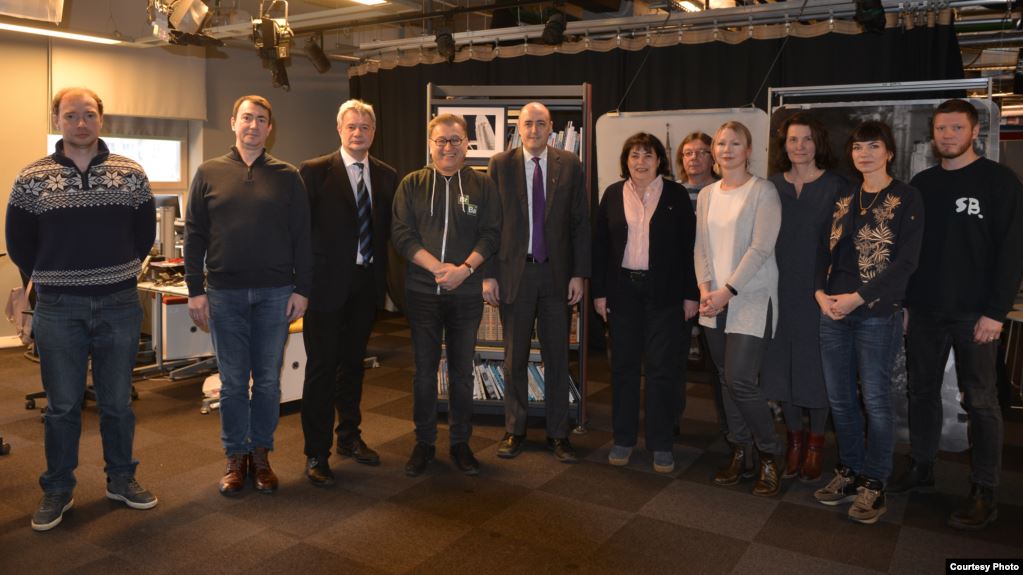RFE/RL seeks to expand in Russia, despite ‘Foreign Agent’ law

Washington, D.C. — Radio Free Europe/Radio Liberty (RFE/RL) President Jamie Fly left Moscow on January 31 with a defiant message following three days of meetings meant to clarify the implications of Russia’s “Foreign Agent” law and discuss plans with his colleagues to expand the company’s journalistic activity in the months ahead.
Fly discussed plans to expand RFE/RL offices in Russia and to seek access to Russian airwaves and TV distribution channels that have previously been denied to the organization.
“We are not going to be intimidated by this latest attempt to silence independent journalism in Russia,” Fly told members of RFE/RL’s Moscow bureau, referring to new amendments to Russia’s “Foreign Agent” law that were signed by Russian President Vladimir Putin in December 2019. He said, “We are going to expand our activities in Russia. Our audiences deserve even greater access to independent news and information in the coming months and years, and we will do everything possible to provide that to them.”
Fly’s trip to Moscow was prompted by an expansion of Russia’s 2017 “Foreign Agent” law that enables authorities to designate individual reporters and contributors as “foreign agents.” In meetings with Foreign Ministry Spokesperson Maria Zakharova and Kremlin Spokesperson Dmitry Peskov, he was told that the amendments were necessary to ensure that conditions for American journalists in Russia were equivalent to those of Russian journalists in the U.S. Fly used the meetings to refute the argument, underscoring the different editorial structures that preserve RFE/RL’s independence from the U.S. government. He also pointed out that “American citizens have no problem accessing RT and Sputnik in the U.S.,” whereas RFE/RL’s situation is totally different in Russia, “since we have no access to radio or TV.”
In a January 30 interview with the local broadcaster Ekho Moskvy, Fly called the new amendments “dangerous,” and described them as part of an increasing effort to persecute RFE/RL journalists and “ensure that Russian citizens receive only information approved by the Kremlin.” He emphasized that RFE/RL’s mission is to provide professional, accurate, and verifiable reporting independent of any government, and insisted that only Russian citizens themselves can decide how to use the information they receive.
During his visit, Fly also met with representatives of the European Union (EU) delegation in Russia and briefed EU member states. He also paid his respects at the site near the Kremlin where Russian opposition figure Boris Nemtsov was assassinated five years ago this month.
RFE/RL has an extensive network in Russia that comprises over 250 journalists and reporting units that include Russian and Tatar-Bashkir Services, the 24/7 TV and digital network Current Time, and new regional projects, including Siberia.Realities, Northern.Realities, Caucasus.Realities, and Idel.Realities, which provide targeted coverage to remote areas that have little access to reliable, local news. These units were designated “Foreign Agents” under the 2017 law.
Collectively, RFE/RL reaches nearly 7 million Russians with its content every week, according to research conducted by Gallup for the U.S. Agency for Global Media in 2018. The Russian Service’s websites earned nearly 100 million visits in 2019, a 10 percent increase over 2018, while views of Russian Service video on its YouTube channel rose to 135 million, up 44 percent over the previous year. In the 12-month period ending in September 2019, Current Time videos were viewed more than 740 million times across digital platforms.
About RFE/RL
Radio Free Europe / Radio Liberty is a private, independent international news organization whose programs — radio, Internet, television, and mobile — reach influential audiences in 23 countries, including Russia, Ukraine, Iran, Afghanistan, Pakistan, the republics of Central Asia and the Caucasus. It is funded by the U.S. Congress through USAGM.
Find out more
Contact Joanna Levison
Director of Media and Public Affairs, Prague
- Levisonj@rferl.org
- 420-221-122-080
Contact Martins Zvaners
Deputy Director of Media and Public Affairs, Washington, DC
- zvanersm@rferl.org
- (202) 457-6948

